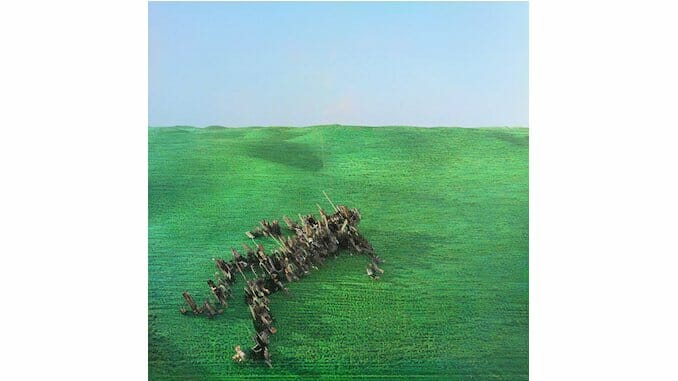Squid’s Paranoia Is Palpable On the Chaotic but Refined Bright Green Field
The British quintet’s utter disregard for rock convention elevates Bright Green Field’s paranoid, vaguely dystopian universe

Toward the end of Squid’s debut album Bright Green Field comes a brief moment of liberation. “Well, I’ve always been told what to do,” the narrator of “Peel St.” mumbles, “but now, I’m free / There’s no warden following me.” Whether the prison from which this character has been released is literal or one of the mind is left for the listener to decide, and most of the details underpinning Bright Green Field’s paranoid, dystopian universe are similarly vague. More immediately apparent is Squid’s utter disregard for rock convention—where drummer-vocalist Ollie Judge’s words leave gaps in his Orwellian brutalism, his chainsaw of a shout-speak and his band’s squawking guitars fill in the blanks.
Though Bright Green Field is easily Squid’s most musically varied and ambitious work yet, the British quintet—whose contemporaries include black midi and Black Country, New Road—remains thematically tethered to the pervasive anxiety and fear that have defined them from their 2019 breakout single “Houseplants” through last year’s Sludge / Broadcaster 10”, their debut for storied electronic and experimental label Warp. If anything, Bright Green Field—co-written by the entire group and produced by Speedy Wunderground mastermind Dan Carey—raises the band’s longtime stakes. Where “The Cleaner,” the highlight from 2019’s Town Centre EP, hinted at simultaneously more abrasive and hooky grooves to come, Bright Green Field delivers on that promise without diminishing Squid’s madness.
Take the nearly nine-minute behemoth “Narrator” as a prime example. Here, Judge’s mumbles of “I’ll play my part!” gradually grow into frantic shouts as guitars swirl like tornadoes into a climax of horror-flick shrieks and wails. With every subsequent repetition of this lyric, it seems increasingly likely that Judge’s character is desperately defending himself to the whole world even though nobody is actually watching him. “2010” is similarly nauseous in both its calmest and most violent moments: As its narrator loses himself amidst the sickening pull of corporate life, the music suddenly transforms from crisp, dissonant arpeggios into a frenzy of Schlagenheim-like overdriven guitar blasts. It’s a breakdown that could make even the most suited-up stockbroker start throwing fists, kind of like that scene from Soul where the hedge fund manager suddenly finds his purpose, but if he found The Armed instead.
-

-

-

-

-

-

-

-

-

-

-

-

-

-

-

-

-

-

-

-

-

-

-

-

-

-

-

-

-

-

-

-

-

-

-

-

-

-

-

-








































